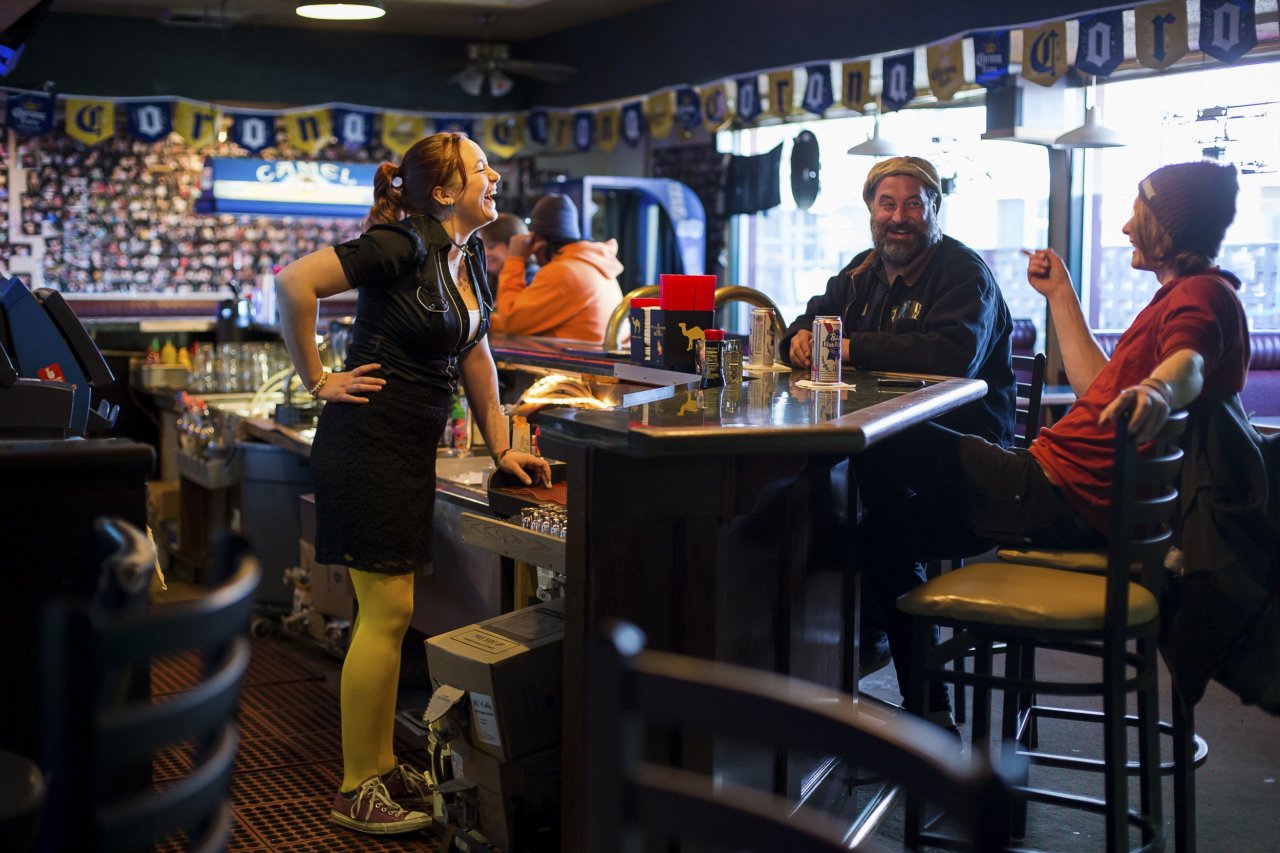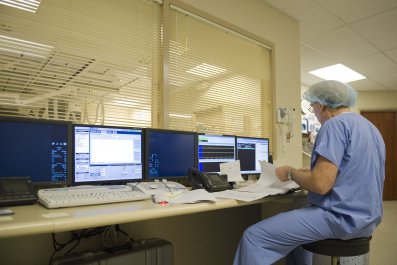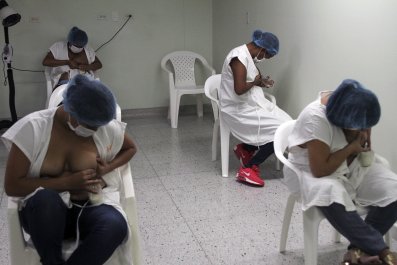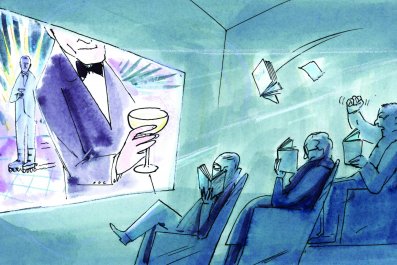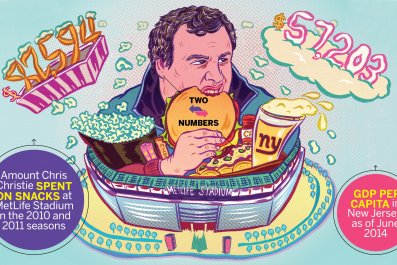This spring, an estimated 2.8 million university graduates will enter the U.S. workforce with bachelor's, master's and doctoral degrees just as America's unemployment rate hits its lowest level in nearly seven years. Cause for celebration, right? Not so fast.
The millennial generation is still lagging in the workplace, just as it did last year. It makes up about 40 percent of the unemployed in the U.S., says Anthony Carnevale, a director and research professor for Georgetown University's Center on Education and the Workforce.
Generation Opportunity, a conservative nonprofit that advocates for millennials, releases a monthly "Millennial Jobs Report" that slices official labor data and tracks unemployment rates for younger workers. As of May, the data show 13.8 percent of 18- to 29-year-olds are out of work, an improvement over 14.2 percent in January and over the same time last year, when it was 15.4 percent. The trend is encouraging, but the number is still way above the national jobless rate of 5.4 percent.
"If you look at the numbers starting in 2009, we've been in the longest sustained period of unemployment since the Bureau of Labor Statistics began collecting their data following World War II," says David Pasch, a spokesman for Generation Opportunity and a 26-year-old millennial. "This misconception that we don't want jobs or that we're lazy and entitled is nonsense."
By 2020, millennials will be an estimated 46 percent of all U.S. workers. "Millennials are going to dominate all the numbers, employment and unemployment, from here on out," says Carnevale. According to the Pew Research Center, the millennial generation, defined as ages 18 to 34, is projected to overtake the baby boomer generation in 2015 as the nation's largest living generation. The millennial population is expected to reach 75.3 million people, surpassing the projected 74.9 million boomers (aged 51 to 69) this year. The Generation X population, defined as ages 35 to 50, this year hovers at around 66 million, according to Pew.
Millennials face higher university tuitions and student loan debt than ever before, as well as stiffer competition when they enter the workforce. A 25-year-old who recently earned a master's and is living with a friend in Washington, D.C., tells Newsweek she is waitressing while looking for a job better suited to her qualifications. "It's hard," she says. "They don't want to pay you extra for your master's. There are enough people with master's degrees that they can require them."
Jacqui Martinez, a 31-year-old principal at consultancy Oliver Wyman in Dallas—a millennial who is her company's millennial recruiter—says that, in her experience, those in her age group don't expect fat salaries or the perfect job. Still, she adds, "they want to be paid enough that they know they're going to be able to pay their bills." Contrary to their reputation for hopping from one position to another, millennials are capable of staying in a job—it's just that most of them have not had that luxury due to repeated layoffs in recent years, says Martinez, who has been in her job for nine years.
Perhaps most infuriating, millennials are getting lower earnings compared with the nation's median income, versus people of that age a decade ago. "We find that because of the difficulties facing millennials, they are delaying these important life decisions, like getting married, buying a home, starting a family," Pasch says.
In a study by Carnevale's center at Georgetown, the age at which young adults on average reach the median wage, across education levels, increased from 26 to 30 between 1980 and 2012. Those hardest hit were high school graduates and young men. Full-time employment for high school graduates declined 13 percentage points for the period, while the rate for university graduates declined by 8 points. As of 2012, young men earned only 58 percent of the mean wage, down from 85 percent in 1980.
Carnevale's center found that the employment rate for young graduates was the worst around the ages of 21 to 25, with the employment rate for that segment falling from 84 percent in 2000 to 72 percent in 2012. During this time, the gap in full-time employment for whites versus African-Americans also widened, from 6 percentage points in 2000 to 14 points in 2012, with African-Americans on average not making the median wage until age 33.
While having a high school degree used to be enough to make it into the middle class, Carnevale says, the bar is higher today. "They're the first generation that needs to have a college degree and experience to compete, before they even enter the workforce."
Carnevale says the worth of a high school education began to decline during the 1970s recession and "started to drop aggressively by 1983." On the one hand, the trend toward a greater level of education for most Americans is promising. The concern, however, is that the rewards are not keeping up with the costs. According to Generation Opportunity, university graduates are entering the job market saddled with an average $33,000 in student loan debt.
According to a study from the Brookings Institution, a nonprofit Washington think tank, the "volume and frequency of student loans increased significantly" from 2002 to 2012, with loans spiking 77 percent. The price tag for attending even an in-state, public four-year college leapt by nearly 32 percent in the same period. (Public colleges say that after factoring in financial aid packages, the rise is closer to 13 percent.) Higher college enrollment explains some of the increase in student loan debt, up 7 percent for the period, but it doesn't account for the full spike.
At the same time, tuitions are unlikely to fall, even though universities are having trouble reaching enrollment goals, and lower birth rates are expected to make that worse.
"We're hearing about this all over the country," says Sarah Coen, a senior vice president at Ruffalo Noel Levitz, an educational consultancy based in Iowa City. "The biggest shake-up that's going to have to happen on the college side is a lower enrollment rate. Colleges will have to diversify their revenue streams to keep up, such as bring in more adult students, online students and international students, and aggressively manage their finances."
On top of that, students who might otherwise be headed to college aren't sure if they want to anymore. While May 1 is the national enrollment deadline for new students, many prospective students this year have not sent in their deposits, a professor in upstate New York tells Newsweek. (To protect his school, he did not want to be identified.) "Since the financial crisis, the market is not recovering," he says. "People registered to go to college are not sending deposits. It's a population of students either not going to college or delaying going to college. We're hearing university enrollment is 10 percent down around the nation."
Carnevale says graduates are feeling let down by their universities, even as the institutions jack up the cost of tuition. "I don't know if you noticed," he says, "but we have a debate raging in this country right now over whether universities are supposed to teach for enlightenment or to prepare students for the job market. You still see presidents at some very prestigious universities arguing for the former, not the latter."
The Georgetown study suggests colleges need to do a better job of preparing graduates for the workforce, and recruiters need to be more transparent in hiring. Once they hit the job market, young people say they are often frustrated by technology walls. Just applying for a job often requires graduates to fly blind: They apply online and never hear back, leaving them to wonder if anyone ever looked at their application, or worse, if the job was even real in the first place. The process also does not offer much feedback that would allow them to learn from their failures.
"It is nearly impossible to find a job that you can apply for directly," says one 28-year-old job hunter who spoke to Newsweek via Twitter.
The process, many millennials say, is very discouraging. "You're like, 'I'll do anything and apply for everything, but usually it's an electronic filing and you're spending all your time on it and never hear back," says the Washington, D.C., graduate. She estimates that, on average, friends who graduated along with her applied for 60 jobs before landing one.
"So far, I have applied for around 30 jobs, if not more, and have heard back on two of them," she says. "I didn't get either job because I don't have enough experience. These are entry-level jobs, but experienced people are taking them."



